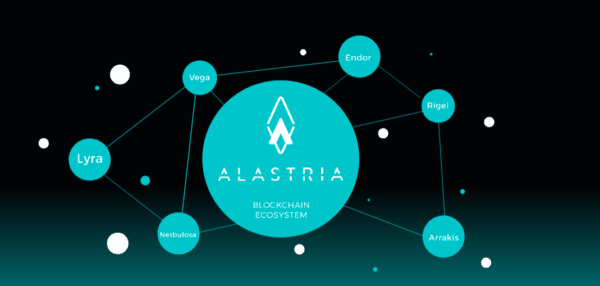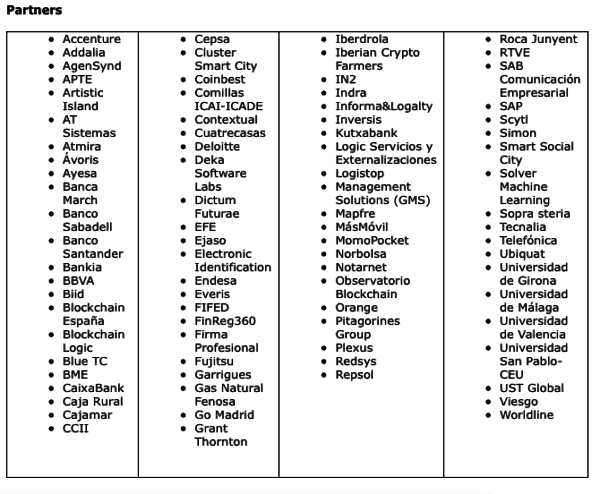
Several leading Spanish banking, energy and telecommunications companies have established Alastria, a new regulated national network based on blockchain. The non-profit consortium was presented simultaneously in the cities of Madrid, Barcelona, Bilbao, Valencia and Malaga with the aim to develop the Distributed Ledger Technology (DTL), which is set to become the new data exchange ecosystem. Alastria anticipates that DLT will enable and accelerate the digital transformation of different industrial and business sectors in the coming years thanks to its agility, veracity, security and efficiency.
 “Blockchain has the potential to become the biggest breakthrough in history in the way we share any digital element, whether it’s a document, a service, a show ticket or money,” explained Alastria CEO Alex Puig. “In this regard, he stressed that the birth of the Consortium was necessary because “the Internet is being reinvented so that we can share and do business in a verified and secure way, but it is necessary to have a standard that allows all industries and the developer community to work with the same base.”
“Blockchain has the potential to become the biggest breakthrough in history in the way we share any digital element, whether it’s a document, a service, a show ticket or money,” explained Alastria CEO Alex Puig. “In this regard, he stressed that the birth of the Consortium was necessary because “the Internet is being reinvented so that we can share and do business in a verified and secure way, but it is necessary to have a standard that allows all industries and the developer community to work with the same base.”
The Alastria consortium has been created to accelerate the creation of digital ecosystems by providing a common collaborative platform: the Alastria network. Since its very creation, the consortium has been made up of about 70 of the largest companies and institutions in different sectors. Among its founders include notaries and lawyers who will ensure the security and veracity of information through the identification of natural and legal persons.

[clickToTweet tweet=”.@alexpuig & Julio Faura: @alastria_es New #Spanish #Blockchain Consortium @fintechinsider_ @crowdfundinsider” quote=”Alex Puig & Julio Faura Give Update on Alastria Blockchain Ecosystem, a New Spanish Blockchain Consortium”]
 “It is not easy for so many important companies to decide to bet a project together from the very beginning. That’s the best proof of the incredible potential that this technology and the consortium have,” candidly stated Alastria president Julio Faura. “We should be proud that a pioneering and unprecedented project throughout the world has been born in Spain, which places the industries of our country at the forefront of digital transformation.”
“It is not easy for so many important companies to decide to bet a project together from the very beginning. That’s the best proof of the incredible potential that this technology and the consortium have,” candidly stated Alastria president Julio Faura. “We should be proud that a pioneering and unprecedented project throughout the world has been born in Spain, which places the industries of our country at the forefront of digital transformation.”
The digital ID will be the main focus of Alastria in its beginnings through the standard of Digital Identity “ID Alastria”, which will allow citizens to have control over their personal information in a transparent way following the guidelines set by the European Union.

The University community will play an important role in the Consortium. At present, several agreements have already been signed with renowned centres including Universidades de Girona, Málaga, Valencia and San Pablo-CEU; an open process is planned in which a significant number of targeted institutions and university centres will also be added order to establish agreements that promote research, experimentation and training.
 The Alastria network will provide a shared platform on which the various participants, and in particular large companies, will be able to create digital representations of the assets with which they work in their usual economic activity, also known as “tokens”. With these tokens it will be possible to develop new products and innovative cutting services, in addition to developing current processes faster, safer and more efficiently. In this way, the network hopes to accelerate the digital transformation of current processes and enables a new paradigm of collaborative and multisectoral innovation in a very efficient way.
The Alastria network will provide a shared platform on which the various participants, and in particular large companies, will be able to create digital representations of the assets with which they work in their usual economic activity, also known as “tokens”. With these tokens it will be possible to develop new products and innovative cutting services, in addition to developing current processes faster, safer and more efficiently. In this way, the network hopes to accelerate the digital transformation of current processes and enables a new paradigm of collaborative and multisectoral innovation in a very efficient way.
Alastria has requested the opening of collaboration channels with Public Administration and Regulators to identify cases of use in public agencies and monitor those services that are in the process of study and analysis. To promote awareness and adoption of the network, Alastria is also organizing training sessions for the Administration. The Alastria consortium will make resources and contacts available to the community so that the ecosystem can grow and expand its potential benefits to more companies and users.
 The Alastria network, a semi-public blockchain, is made up of nodes – computers hosted by several participants – and provides shared accounting recording services. In this way, the partners of this network will be able to develop services and products within Alastria with total confidence and security. The fact that each member’s digital identity is certified and guaranteed allows them to use smart contract technology (smart contracts) on which they can offer services and exploit applications in a cross-sectional environment and with full legal guarantees in Spain.
The Alastria network, a semi-public blockchain, is made up of nodes – computers hosted by several participants – and provides shared accounting recording services. In this way, the partners of this network will be able to develop services and products within Alastria with total confidence and security. The fact that each member’s digital identity is certified and guaranteed allows them to use smart contract technology (smart contracts) on which they can offer services and exploit applications in a cross-sectional environment and with full legal guarantees in Spain.

